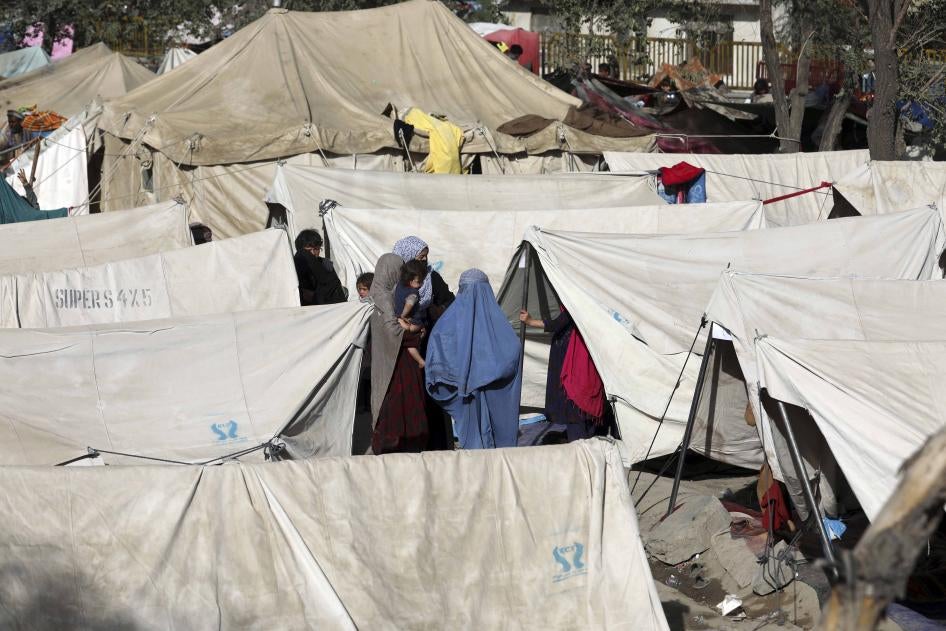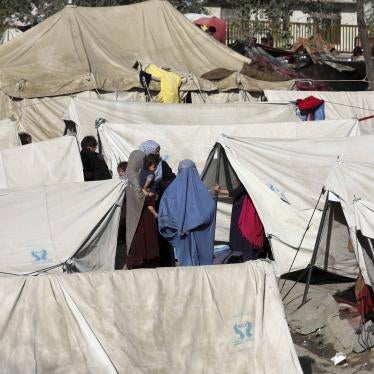(New York) – Afghans at risk who have fled or are seeking to flee Afghanistan need greater international support, Human Rights Watch said today in a new policy briefing paper. The United Nations system and concerned governments should improve their assistance to Afghan refugees and asylum seekers, including those in countries neighboring Afghanistan, transit countries, and countries of resettlement.
The briefing paper, “Policy Responses to Support Afghans Fleeing Taliban-Controlled Afghanistan,” urged UN agencies and governments hosting Afghan refugees and asylum seekers to focus on increasing refugee resettlement and building better pathways to safe and durable solutions for Afghans needing protection. These include those eligible for family reunification visas or special visas available because of their past work in Afghanistan.
“Since the Taliban takeover of Afghanistan, many Afghans at grave risk are depending on governments to respect the right to seek asylum,” said Bill Frelick, refugee and migrant rights director at Human Rights Watch. “Responding effectively to this humanitarian crisis demands refugee and migration policies that are generous, rights-respecting, and culturally sensitive.”
Since the Taliban took over Kabul, Afghanistan’s capital, on August 15, 2021, Human Rights Watch has interviewed Afghan refugees who report having been harassed, beaten, and extorted by Taliban officials as they attempted to leave the country. Human Rights Watch also documented abuses against people in many provinces associated with the former government, including former security forces personnel and members of the judiciary. Those at greatest risk include human rights defenders, women’s rights activists, high-profile women, journalists and other media workers, judges, and others who held official administrative and security positions.
Concerned governments should use whatever influence they have with the new Taliban authorities to allow Afghans to exercise their basic human right to leave the country, Human Rights Watch said. Afghans seeking to flee now have fewer options to depart the country as Pakistan canceled flights by its national carrier between Kabul and Islamabad. A private Afghan carrier, Kam Airways, and Qatar Airways continue to operate limited flights out of the country. This should include establishing an orderly departure program for Afghans seeking protection abroad. Any such program would need to be strictly understood as supplemental to other pathways to protection and not a substitute for the right to leave one’s country to seek asylum elsewhere.
Neighboring countries should open their borders to Afghan asylum seekers, and all governments should suspend deportations or returns of Afghans indefinitely, Human Rights Watch said. Human Rights Watch has documented Turkish authorities summarily pushing Afghan asylum seekers trying to cross into Turkey from Iran back to Iran, in violation of international law. Because of the dramatically changed situation in the country, governments should reopen and review asylum cases of Afghan asylum seekers whose cases have previously been rejected. They should also provide a pathway to permanent residency to Afghans who have lived on their territory for many years and established ties to their countries.
Countries outside the region should make significantly more resettlement places available for Afghan refugees, while helping financially to support Afghan refugees in countries of first arrival in the region. Governments should also expand complementary pathways to facilitate safe and orderly migration for Afghans. These pathways may include special programs developed for Afghans, private and community sponsorship, family reunification, visiting scholar, student, artist, and humanitarian and other professional work visas.
While the scale of the problem requires robust government funding and engagement, governments should also encourage, expand, and support private sponsorship programs by individuals, groups, faith-based or diaspora groups, municipalities and cities, and universities to welcome Afghans.
Many Afghans are leaving their homes traumatized and vulnerable. Programming should include mental health support for new arrivals, taking into account the trauma of forced flight and the specific hardships Afghans may have faced in Afghanistan and after leaving the country.
The education of newly displaced Afghan children has already been interrupted by the conflict, the Covid-19 pandemic, and now by flight. Neighboring countries, third-country processing sites, and any other country hosting Afghan refugee children should ensure that all girls and boys have access to quality and inclusive education without discrimination within three months of arrival.
“Afghans have many reasons to flee and fear,” Frelick said. “It’s now in the hands of governments around the world to give them reason to hope.”








